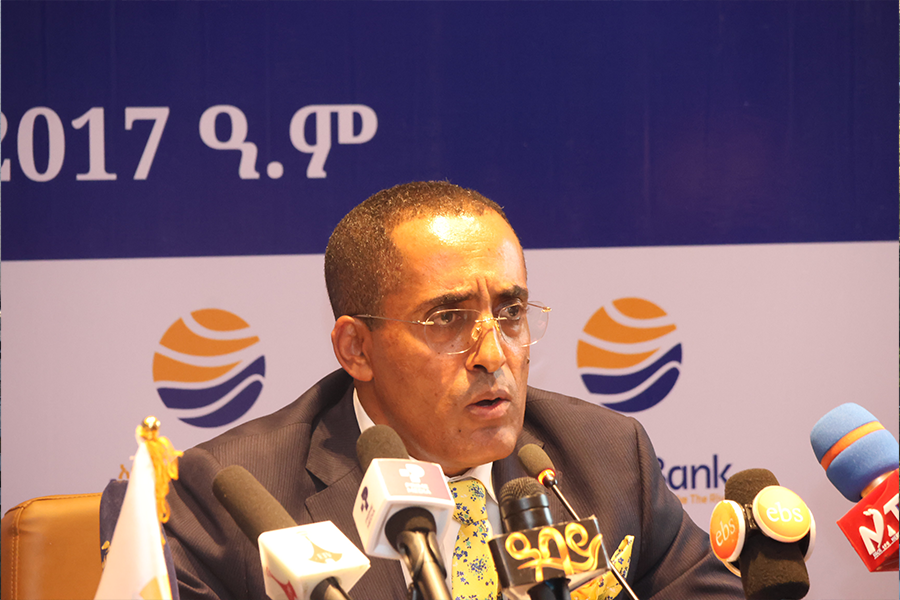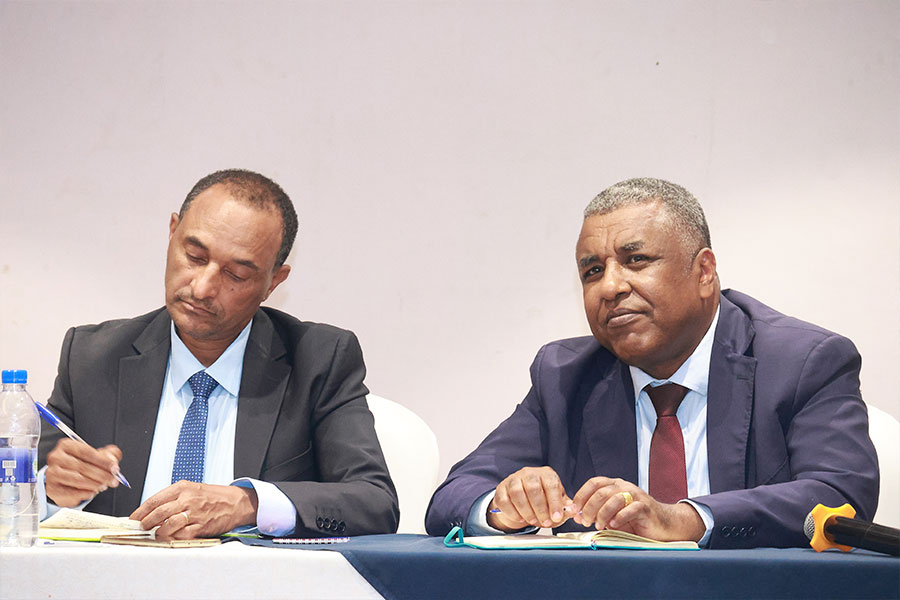
Dec 11 , 2020
By Boureima Hama Sambo (MD)
The weaknesses that the COVID-19 crisis has highlighted should be addressed, and there should be more investment in building a resilient future. Ultimately, the political commitment toward universal health coverage should be renewed to avoid the occurrence of a crisis of this scale and impact, writes Boureima Hama Sambo (MD), WHO representative in Ethiopia.
In September 2019, world leaders at the United Nations General Assembly adopted the UN Political Declaration of the High-level Meeting on Universal Health Coverage (UHC). In adopting the Declaration, UN Member States committed to advance toward UHC by investing in health systems, especially the foundations for stronger primary healthcare.
The UN Secretary-General, António Guterres, welcomed the political declaration on UHC as “the most comprehensive agreement ever reached on global health.”
A few months later, the COVID-19 pandemic exposed the fault lines and underlined the need to strengthen our commitment toward universal coverage, including investments in building sustainable and resilient health systems. As UHC Day is commemorated on December 12, our commitment toward UHC, as well as some of the lessons from the current crisis, needs to be reflected upon.
I believe that the pandemic has brought to attention two critical aspects. One is the commitment toward UHC – ensuring health for all without incurring financial hardship – is fundamental to making sure that everyone, everywhere, has access to quality services, including testing and treatment for COVID-19. Another is the fact that UHC and health security are intertwined, and strong health systems are vital to responding to health crises. There cannot be an alternate narrative.
In Ethiopia the Growth & Transformation plans, which extended throughout the past decade, called for "Envisioning Ethiopia’s Path to UHC through the strengthening of Primary Health Care." To achieve this, the newly launched Health Sector Transformation Plan II of the Ministry of Health identifies accelerating progress toward UHC as a key objective to be achieved by building a resilient and responsive health system that is based on the foundations of primary healthcare.
Such focus on health systems and emergency preparedness, especially through the flagship Health Extension Programme, which delivers basic health services at the community level, has helped Ethiopia to launch a relatively effective response to the COVID-19 Pandemic.
Nonetheless, despite the efforts, more than 114,000 Ethiopians have tested positive for COVID-19 and over 1,760 have succumbed to the virus. In addition, COVID-19 has impacted the delivery of other essential health services and laid bare some unaddressed gaps – inadequate investment in system resilience, structural inequalities and low social protection. Moreover, the social and economic consequence of the crisis has brought to the fore the need to invest in health to ensure sustainable development.
Today, we have an opportunity to renew our commitment to build a stronger health system and economy to cope with future threats.
Primarily, COVID-19 is a stark reminder that, as part of the social contract, ensuring people’s health ranks high among the primary responsibilities of the government. As COVID-19 has illustrated, this requires bold political decisions and responsible leadership at the highest levels. In Ethiopia, the timely actions taken to prepare for the pandemic resulted in a more effective response. The National Ministerial Committee, under the Prime Minister’s Office, facilitated a multi-sectoral response that included intersectoral task forces (or “emergency coordination centres”) at the regional and district levels.
It has demonstrated that coordination and strategic collaboration with non-health sectors are possible to achieve better health outcomes. Such high-level political leadership and commitment must be sustained in the quest to achieve universal coverage and build more resilient health systems.
Just as importantly, COVID-19 and its economic fallout has demonstrated the importance of investing in health. It has reinforced existing evidence that investments in health have long-term returns, while underinvestment has potentially devastating social and economic effects that could last for years. The International Monetary Fund (IMF) projects that global output will fall by 4.9pc in 2020 due to devastating economic downfalls created by direct COVID-19 repercussions.
After years of steady growth, the economic outlook for Ethiopia also looks grim at the moment, with a predicted economic growth of 1.9pc in 2020 and flat growth in 2021. This will have implications on the ability to increase domestic investment in health and preparedness. Despite this, the need for higher public financing on health cannot be ignored. Governments will have to step up investment in strengthening health systems and innovation, including vaccines, diagnostics, medicines and digital solutions. Moreover, where opportunities for external support exist, these must be harmonised to reduce fragmentation.
Not to be underestimated is also how COVID-19 has demonstrated that health is everyone’s business. A health threat anywhere is a health threat everywhere. At the global level, it has underlined the need for countries to come together to ensure coherent action. At the country level, it has highlighted the importance of establishing a "whole of government" approach.
To mitigate the consequences of the pandemic, the health sector has been forced to forge and strengthen existing partnerships not only with other organs of the government, but also with civil society organisations and the private sector. These partnerships need to be bolstered to promote actions in non-health sectors – such as education, infrastructure, agriculture, finance and energy – to address the social, environmental, commercial and political determinants of health.
Finally, COVID-19 has established that social solidarity and public trust are essential. Governments must meaningfully and transparently engage communities in their response. It has also highlighted that the most vulnerable members of the community – the poorest, the oldest, those with existing underlying health conditions – need better protection. Further, it has also brought into focus that the needs and rights of women and girls are often neglected.
The pandemic has explicitly underlined the need for a "whole of society" approach that includes targeted measures to address the health and economic vulnerabilities of specific socioeconomic groups. It has shown that community engagement matters and context-specific approaches are essential for high-quality preparedness and response. This is a clear indication that effective community engagement mechanisms are fundamental for building future resilience.
Countries such as Ethiopia are now at a critical juncture. After the initial success in suppressing transmission, as restrictions are eased, the risk of a resurgence of COVID-19 remains imminent. While vaccines are already being rolled out in some developed countries such as the United Kingdom, we cannot afford to relax preventive measures. We must strive to strike the right balance between protecting public health, protecting personal liberties, and keeping the economy going.
It is critical that we continue to find our way out of the current crisis using the tools available. Strong health systems grounded in primary health care are needed for universal health coverage, health security and economic stability. We must address the weaknesses that the COVID-19 crisis has highlighted and invest more in building a resilient future. Ultimately, we must renew our political commitment toward UHC to avoid the occurrence of a crisis of this scale and impact and ensure a safer and more rapid recovery from the pandemic and its far-reaching impact.
PUBLISHED ON
Dec 11,2020 [ VOL
21 , NO
1076]


Radar |

Radar | Jun 11,2022

Radar | May 07,2022

Exclusive Interviews | Nov 06,2021

Life Matters | Nov 14,2020

My Opinion | 131584 Views | Aug 14,2021

My Opinion | 127940 Views | Aug 21,2021

My Opinion | 125915 Views | Sep 10,2021

My Opinion | 123539 Views | Aug 07,2021

Dec 22 , 2024 . By TIZITA SHEWAFERAW
Charged with transforming colossal state-owned enterprises into modern and competitiv...

Aug 18 , 2024 . By AKSAH ITALO
Although predictable Yonas Zerihun's job in the ride-hailing service is not immune to...

Jul 28 , 2024 . By TIZITA SHEWAFERAW
Unhabitual, perhaps too many, Samuel Gebreyohannes, 38, used to occasionally enjoy a couple of beers at breakfast. However, he recently swit...

Jul 13 , 2024 . By AKSAH ITALO
Investors who rely on tractors, trucks, and field vehicles for commuting, transporting commodities, and f...

Jun 28 , 2025
Meseret Damtie, the assertive auditor general, has never been shy about naming names...

Jun 21 , 2025
A well-worn adage says, “Budget is not destiny, but it is direction.” Examining t...

Jun 14 , 2025
Yet again, the Horn of Africa is bracing for trouble. A region already frayed by wars...

Jun 7 , 2025
Few promises shine brighter in Addis Abeba than the pledge of a roof for every family...

Jun 29 , 2025
Addis Abeba's first rains have coincided with a sweeping rise in private school tuition, prompting the city's education...

Jun 29 , 2025 . By BEZAWIT HULUAGER
Central Bank Governor Mamo Mihretu claimed a bold reconfiguration of monetary policy...

Jun 29 , 2025 . By BEZAWIT HULUAGER
The federal government is betting on a sweeping overhaul of the driver licensing regi...

Jun 29 , 2025 . By NAHOM AYELE
Gadaa Bank has listed 1.2 million shares on the Ethiopian Securities Exchange (ESX),...